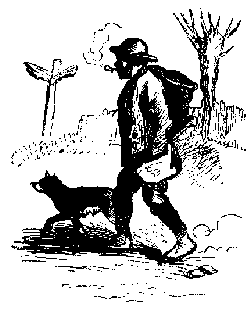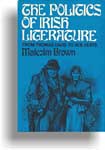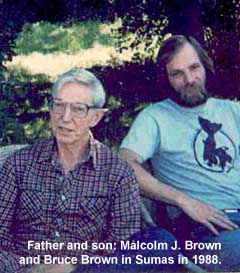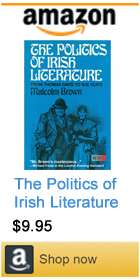Chapter Three
O'Connell and Davis in Partnership
A MOMENTOUS episode in Irish literature was a public quarrel that took place in 1845 between Thomas Davis, a poet, and Daniel O'Connell, the political leader of Ireland. The tacit partnership of these two, which preceded their quarrel, was still more momentous. When the two great nationalists were working in amity, they generated a force so explosive that they frightened everybody, themselves not least.
The O'Connells were ancient Catholic landowners who had by an oversight escaped dispossession under the English plantations and the Penal Laws. Their vast lands at Darrynane were infertile but picturesque, bounded by the Atlantic cliffs of Kerry that mark the extreme western limits of Europe. Daniel was the son of a mere shopkeeper, a fact from which his aristocratic enemies derived some satisfaction. But thanks to boundless energy and a precocious wit, he was singled out for favorite by a wealthy uncle called "Old Hunting Cap," the captain of the clan, a landowner and smuggler. He inherited his uncle's great property, and along with it, a certain complacency toward the Providence by which worldly favors are bestowed. In later years a foreign journalist who was invited to stay for dinner at Darrynane sat down at table with more than one hundred cousins, menials, and guests, with the old man presiding loquaciously at the head like a Scots Highland chief (but less bibulous, says Lecky). Another journalist visitor, a spy from the Times, found the Darrynane medieval tenantry living in up-to-date squalor.
O'Connell was among the first Catholics to be called to the Irish bar after the second relaxation of the Penal Laws in 1793. While still a youth, he established himself as the most brilliant Irish advocate of the age, displaying an expert command of law and a skill in swaying juries that Irishmen came to think supernatural. Where the Englishman's law was the hereditary enemy and the crown prosecutor a stock villain, his sensational acquittals for the defendant made him automatically a folk hero. The next step from law into politics was natural. Ireland demanded a fighter, and now his pugnacity came to the fore. The O'Connell political headquarters was kept busy negotiating affairs of honor with numerous dignitaries whom he had insulted, among them Benjamin Disraeli and Sir Robert Peel; and one of his challengers, a Protestant alderman named D'Esterre, was killed by O'Connell's bullet. His detractors have made much of the scurrility of his tongue, and Yeats once blamed it for all the sorrows of Ireland. Without doubt he was guilty of verbal intemperance, but his angriest and most vituperative words could not match the vilification to which his enemies subjected him every day of his life for half a century.
One of his political talents was a humorous, palavering manner, a habit for which his somber contemporaries used the term "undue levity." The Irish word game was his special pleasure. He invented the nickname "Orange Peel" to deflate the redoubtable Sir Robert. It was his opinion that the lord chancellor, Sir Edward Sugden, bore a name that one must hesitate "to give to a pig." Here again Yeats blushed at the vulgarity, quite unnecessarily. Behind the plain, stark tragedy of insurgence there lurks a more intimate comic face, arising from enthusiastic social motion uninhibited by guidelines. In a later time Frank O'Connor and Peadar O'Donnell would catch the comic energy of a political resurgence, though the richest formulation belongs to O'Casey's reminiscences and constitutes his particular glory. O'Connell's subversive horseplay did set him apart from Irishmen who wore the long face, from Davis, Smith O'Brien, Parnell, Devoy, Arthur Griffith, de Valera, and, surprisingly, from James Joyce, whose depiction of this special flavor in Irish history is uniformly sour and unimaginative. But it put him in the happy company of Swift, Wolfe Tone, "Big Jim" Larkin, Michael Collins, and the rest of the Irish pantheon who were not born humorless, including W. B. Yeats himself.
The stenographic reports of O'Connell's Irish speeches often had to use the parenthesis "prolonged laughter." More often the notation was "hear, hear." As an orator he was demonstrably one of the most effective in world history. His voice was said to have had an extraordinarily arresting quality, pleasing to the ear and capable of both sweet nuance and a rasping, bellowing roar which could penetrate to the fringes of an assembly of a million people. His oratorical rhetoric was not florid, but was blunt, lucid, sarcastic, and devoid of genteel ornament. "Mr. O'Connell advanced to the front of the platform and thanked his listeners for their applause" -- this was the newspapers' ritual introduction to the verbatim reports of his speeches. He then proceeded in careless ease, circling discursively about the topic of the day, rather like an ordinary citizen thinking out loud:
- The enemies of Repeal talked about agitation, forsooth, preventing the influx of English capital. A more absurd idea never entered the mind of man (hear, hear). But he denied that any rational dispassionate man could entertain it for a moment. It was a mere miserable pretence, the fallacy of which must be evident even to those who use it. He asserted distinctly that not one shilling of English capital was kept out of this country by agitation. If English capital was to be kept out of countries where agitation existed, how did it come that it had found its way in such enormous quantities to the States of South America, where not only agitation but actual revolution might be said to be the order of the day (hear, hear)? It was well known that in Buenos Ayres alone, where bloodshed and confusion prevailed to a frightful extent, English capital was invested to the amount of several millions (hear, hear). It was all a mockery therefore to pretend that English capitalists would not come over here, because the Irish people peaceably and constitutionally agitated to have their wrongs redressed. Why did they not come when we were tranquil and noiseless (hear, hear)?
This style does not sound very intoxicating, yet multitudes of listeners found it so. Often it touched the Irish throng with warmth and immediacy, voicing their deepest and most passionate longings. O'Connell spoke to Irishmen, said Sean O'Faolain, in "the secret language of fellowship in 'helotry." After a century and a half of stupefaction, his countrymen roused to life to cheer their vindicator, the pure Celt who defied the Protestant Ascendancy in its inner sanctum, disdaining its rage against his "ruffian," "blackguard" impudence. The intimacy and authority of his rapport with the Irish people became the ideal of all subsequent Irish leaders-political or cultural-though none ever recaptured the old Liberator's magic touch....
|
|
Table of Contents
|

|
Astonisher.com is pleased to offer these excerpts from The Politics of Irish Literature by Malcolm Brown...
Praise for
The Politics of Irish Literature |
 |
|
"This brilliant study of the intersection of politics and literature in Ireland amounts to a dazzling portrait gallery. Reading it one feels about one the breath, warmth, and passions of the dead all come alive again."
-- Sean O'Faolain in the Manchester Guardian
"Mr. Brown's masterpiece has made me want to hire a nearby housetop and recite whole chunks to every passerby..."
-- Michael Foote in the London Evening Standard
"The author of the best book on George Moore now gives us what is in all likelihood the best book on the politics of modern Irish literature."
-- Virginia Quarterly Review
|
|

University of Washington Professor Malcolm J. Brown (1910 - 1992) with his son, Bruce Brown, in Sumas, WA, July 1988.
|
Additional reading -- Malcolm Brown's George Moore: A Reconsideration. Also see Bruce Brown's commentary on The History of the Corporation for Malcolm Brown's contribution to that work.
|
|
|






